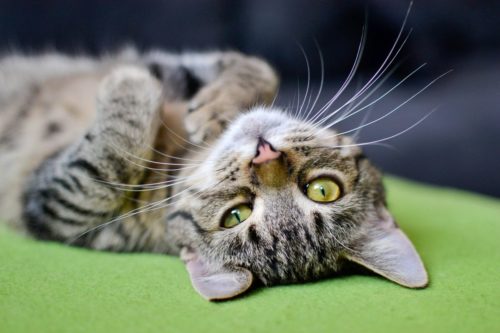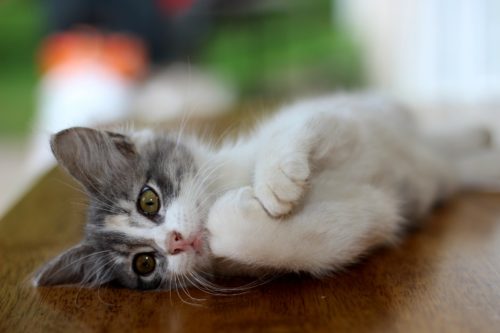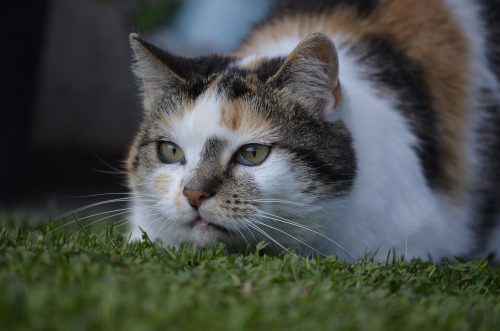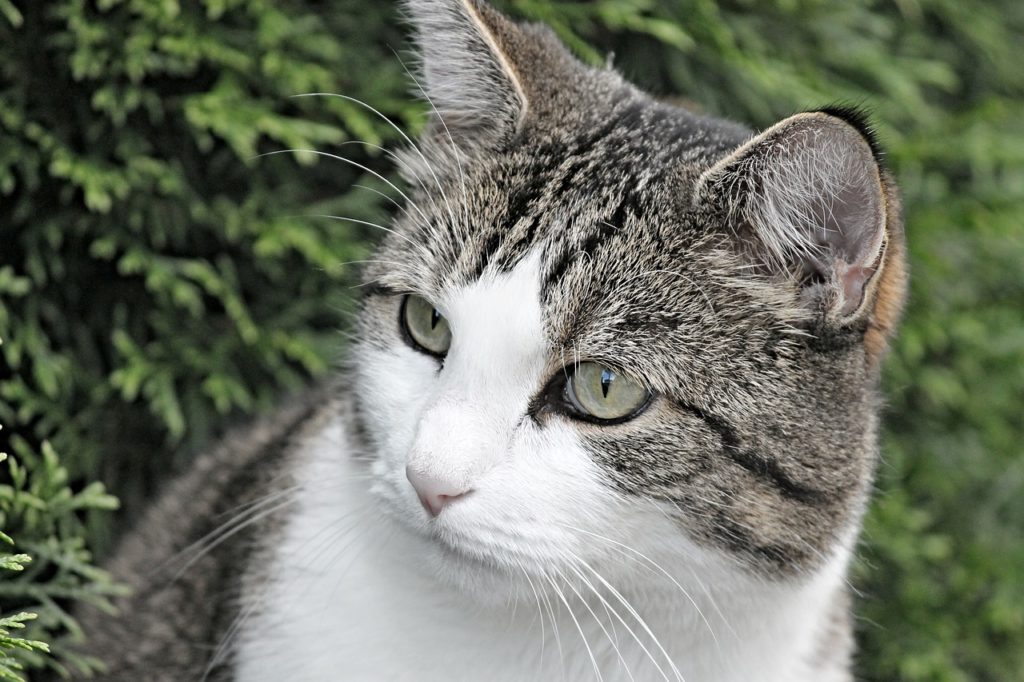Did you know that cats can suffer from similar thyroid conditions to those that afflict human beings? One glandular thyroid condition that cats can suffer from is called hypothyroidism. Hypothyroidism in cats is also sometimes referred to as thyroid hormone deficiency. Hypothyroidism is the less commonly understood glandular thyroid disorder, with many more people being familiar with hyperthyroidism. While hyperthyroidism is due to an excess of thyroid hormones that drive various hormonally reliant processes within the body into overdrive, hypothyroidism is the opposite.
Hypothyroidism results from a deficiency of thyroid hormones within the bloodstream. If you are worried your cat may be suffering from hypothyroidism, it is important to visit a licensed veterinarian in order to get a diagnosis and receive recommendations of different treatment options. In order to detect hypothyroidism in your cat early, it is important to understand what hypothyroidism is, the potential causes of hypothyroidism in cats, common symptoms of hypothyroidism, how a veterinarian will diagnose hypothyroidism, and the potential treatment options available.
An Overview of Hypothyroidism in Cats
Hypothyroidism is a type of endocrine disorder that cats sometimes develop. It is important to note that hypothyroidism is a rare condition in cats. In cats, the thyroid gland is a key component to a number of processes within the body. The thyroid is an essential gland and produces a number of different hormones within the body. Two of the most common known thyroid hormones are liothyronine (T3) and levothyroxine (T4). Both liothyronine and levothyroxine play a role in metabolic function within the body.
When a cat is suffering from hypothyroidism, they have noticeably lower than normal levels of thyroid hormones in the bloodstream. Because fewer thyroid hormones are being produced and traveling throughout the body, the metabolism will slow down considerably. In some cats, other complications may also occur as a result of fewer thyroid hormones being released throughout the body. With this understanding in mind, it is now vital to know some of the main causes of hypothyroidism in cats.
Causes of Hypothyroidism in Cats
Because of how rarely hypothyroidism occurs in cats, there is no significant understanding as to how and why hypothyroidism develops in some cats. The most common cause of hypothyroidism in cats is as a result of treatment for hyperthyroidism. When a cat is suffering from hyperthyroidism, their thyroid gland overproduces levothyroxine, causing the metabolism to function on overdrive. Hyperthyroidism can cause cats to display symptoms of diarrhea, increased thirst, increased urination, vomiting, hyperactivity, weight loss, and increased appetite. To correct this condition, veterinarians utilize one of three main treatment options: oral medication, radioactive iodine therapy, or surgery.
Hypothyroidism in cats most often occurs after a cat has received surgery or radioactive iodine therapy to treat hyperthyroidism. During the surgery, which is called a bilateral thyroidectomy, the overactive thyroid glands or the thyroid adenoma is removed. During the radioactive iodine therapy, radioactive iodine is injected into the cat and concentrated within the thyroid gland, where it irradiates and destroys the hyperactive tissue. While both of these methods of treatment are useful for curing hyperthyroidism, in some cases cats can develop hypothyroidism as a side effect of the treatment.
Hypothyroidism also can develop due to a number of other different potential causes. Some cats may develop hypothyroidism as a result of having cancer. It is not uncommon to see cats that develop concurrent conditions or conditions that are both present and affect one another. Another cause sometimes attributed to the development of hypothyroidism is due to an iodine deficiency. For some cats, hypothyroidism can also develop as a part of a congenital disease. In addition to these causes, there have been some cases where veterinarians have not been able to pinpoint the cause of the hypothyroidism. In these instances, veterinarians will indicate that the hypothyroidism is of unknown etiology (origin). It is sometimes believed that some cats may be genetically predisposed to develop hypothyroidism, particularly as they age and their bodily processes change, but this is not agreed upon.
Common Symptoms of Hypothyroidism in Cats
Because hypothyroidism is caused by a decreased number of thyroid hormones in the bloodstream, a number of bodily processes are affected and as a result, produce symptoms that indicate abnormal function. The thyroid directly affects the metabolism, and in cats affected by hypothyroidism, the metabolism can slow down considerably. This can result in weight gain. Hypothyroidism can also cause a considerable loss of energy, which results in symptoms of lethargy and inactivity. Cats may also begin to appear weak or may show less mental acuity than they normally would. This is sometimes referred to as mental dullness.
Hypothyroidism can also cause a decrease in body temperature due to a deficiency in thyroid hormone. Even a small change in thyroid levels can significantly change the body temperature. In addition to these symptoms, cats can also display a number of other symptoms, including unkempt appearance, loss of hair (alopecia), delayed teeth eruption, constipation, matting of the fur, or a flaky hair coat. Cats suffering from hypothyroidism will likely only show a handful of these symptoms depending on the severity of the thyroid hormone deficiency and their unique genetic composition.
Diagnosing Hypothyroidism in Cats

If you believe your cat is suffering from hypothyroidism, it is vital that you make an appointment with a licensed veterinarian. When you are at your appointment with your veterinarian, they will likely begin by getting a complete medical history of your cat, including any medical conditions or treatments they have had, their age, their overall health, and the duration and severity of their symptoms. Since hypothyroidism in cats is rare, it is important to provide your veterinarian with a detailed and thorough history of your cat’s health prior to displaying symptoms. This will help them to establish a baseline of your cat’s normal health, which they can then compare to their current symptoms to determine which symptoms are a significant departure from their normal health.
The veterinarian will often weigh your cat during this initial discussion, and then they will begin to conduct their physical examination. During the physical examination, they will assess a number of different external physical features and aspects of your cat to assess what may be causing their symptoms and to determine what further testing they will need to make a diagnosis.
Diagnosing hypothyroidism is often an extremely thorough process that requires significant investigation. It is likely that your veterinarian will request laboratory tests to get a better picture of how various processes are functioning within your cat’s body. This will likely include a complete blood count (CBC), blood chemistry, and urinalysis. Some veterinarians may be able to make a diagnosis off these tests alone, but many will request additional endocrine testing to get a clear picture of thyroid function and the levels of thyroid hormone in the bloodstream.
A simple blood test allows the veterinarian to check the levels of liothyronine and levothyroxine in the bloodstream. If these hormones fall below of the normal range, this is an indication that your cat has hypothyroidism. Some veterinarians may also request radiographic studies to examine internal organs. Radiographic studies will allow a veterinarian to examine internal organs to see abnormalities that may be causing the thyroid to not function correctly.
Treating Hypothyroidism in Cats
Hypothyroidism is usually transitory in cats, meaning that it is not permanent and will correct itself. Cats that do experience hypothyroidism as a result of radioactive iodine therapy or surgery often require time after their treatment for their body to readjust and regulate its thyroid hormones. Because hypothyroidism is commonly transitory, it usually does not require intervention and treatment. If at all possible, it is usually best to allow the cat’s body to regulate its own processes rather than intervene and create a dependency. However, in some cases treatment is required if the hypothyroidism does not resolve on its own. In cases where treatment is required, it is usually necessary for the cat to receive treatment for the duration of its life.
To treat hypothyroidism in cats, the thyroid hormones (liothyronine and levothyroxine) are given to the cat in a synthetic form. The veterinarian will analyze the levels of the thyroid hormone in the blood to determine the correct dosage. Finding the right dosage can take a bit of trial and error in some cases as thyroid levels can fluctuate and change over time. The veterinarian will take into consideration the overall physical condition and progress of the cat over time to determine how to adjust the dosage over the course of their lifetime.
In cats that do require a synthetic dosage of thyroid hormones to regulate their thyroid function, symptoms of hypothyroidism usually resolve within a few months from beginning treatment. Cats that do require synthetic doses of thyroid hormones each day will require regular check-ups and blood tests in order to make sure that their thyroid levels remain within normal range over time. If the veterinarian detects a shift in thyroid function, they can then adjust the dosage accordingly to make sure that symptoms of hypothyroidism do not arise again.
Cats Living with Hypothyroidism
As a pet owner, maintaining a treatment plan with an animal that has a chronic condition can be difficult and daunting. If your cat has been diagnosed with hypothyroidism that is not transitory and requires prescribed medication to control, then you will need to make a shift in your life to accommodate their health condition. In many cases, your cat will need to take a dose of medication each day for the rest of his life, will need a regular blood test to check thyroid levels, and may require a diet change to help control symptoms. This can dramatically shift your daily routine and requires a conscientious approach to successfully treat your cat for hypothyroidism long-term.

The most important facet of living with hypothyroidism is to make sure that you comply with any prescribed medications and diets that are required to successfully treat hypothyroidism. It is important to be consistent and aware of the dosage of the medication you are required to administer each day. Giving the wrong dose of synthetic thyroid hormones can radically shift thyroid function in your cat and can lead to negative side effects, so it is important to be mindful of the dosage you are administering on a daily basis. Over time, you may be tempted to adjust the dosage yourself if you see your cat is not reacting in the same way to the prescribed dose. It is vital that you not change the dosage of the synthetic thyroid hormones without first consulting with your veterinarian. It may be a pain sometimes to make the time and allocate the funds to take your cat to the veterinarian for check-ups and endocrine testing, but it is vital that you do so to maintain the health of your cat and keep them from experiencing negative symptoms.
It is also important to note that you should not introduce new foods or medications to your cat without consulting with your veterinarian first. It can be tempting to try a new herbal remedy or medication that someone you know had success with when treating their cat for hypothyroidism, but it may interact with his current prescription drugs in an adverse way. Switching medications or trying an herbal remedy is only one example of a situation in which you need to consult with your veterinarian, another important facet of your cat’s health to consult with your veterinarian about is their diet and any modifications you plan to make.
Veterinarians often recommend a reduction in fat in the cat’s diet during their initial phase, and if you choose to switch their diet without informing your veterinarian, you could unwittingly endanger the efficacy of your cat’s treatment. Even small diet or lifestyle changes can have a tremendous impact on the effectiveness of your cat’s treatment, so always err on the side of caution and run any changes you plan to make by your veterinarian. With a well-regimented treatment plan, your cat should be able to lead a healthy and happy life.




